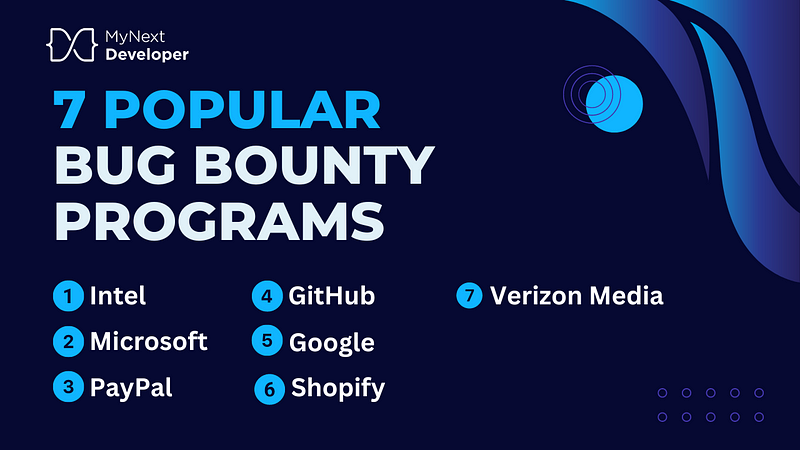Exploring Bug Bounty Hunting as a Promising Career Choice for Cybersecurity Professionals
Exploring Bug Bounty Hunting as a Promising Career Choice for Cybersecurity Professionals

In the realm of cybersecurity, bug bounty hunting has emerged as a lucrative and exciting career path for aspiring professionals. This innovative approach to cybersecurity not only offers financial rewards but also provides invaluable hands-on experience in identifying and addressing vulnerabilities in digital systems. In this blog post, we delve into the question: Is bug bounty hunting a viable career path for aspiring cybersecurity professionals?
Introduction to Bug Bounty Hunting
Bug bounty hunting refers to a process where individuals, often skilled hackers, detect and report software bugs or vulnerabilities to organizations in exchange for rewards. This practice, also known as a vulnerability rewards program (VRP), has gained significant popularity due to its effectiveness in identifying and addressing security weaknesses before cybercriminals exploit them.
Definition and Evolution
Bug bounty programs involve incentivizing ethical hackers to find and report vulnerabilities in websites, software, and other digital assets. By harnessing the power of the crowd, organizations can continuously test their systems, receive feedback, and enhance their cybersecurity posture. This approach has evolved as a cost-effective and efficient method to complement traditional penetration testing, allowing for more comprehensive identification of vulnerabilities.
Importance in the Cybersecurity Landscape
In the ever-evolving cybersecurity landscape, bug bounty programs play a crucial role in helping organizations stay ahead of cyber threats. With the rise of cyber-attacks and data breaches, bug bounties provide a way for companies to leverage the expertise of ethical hackers globally to identify and address vulnerabilities effectively. By offering rewards to bug hunters, organizations can proactively patch weaknesses, enhance their security measures, and protect sensitive data and assets from malicious exploitation.
Bug bounty hunting has become an essential tool for organizations of all sizes to enhance their security measures, identify vulnerabilities, and maintain a secure network in the face of increasing cyber threats. Through bug bounty programs, companies can tap into a diverse pool of talent, save costs, and improve their overall cybersecurity posture by addressing vulnerabilities before they are maliciously exploited.
Skills Required for Bug Bounty Hunting:
Bug bounty hunting requires a specific set of skills to be successful in identifying vulnerabilities and reporting them effectively. Here are the key skills needed for bug bounty hunting:
Technical Proficiency:
- Understanding of Web Applications: Bug hunters need to comprehend how web applications work, including knowledge of network fundamentals, SQL databases, and web components like HTML, CSS, PHP, and JavaScript.
- Scripting Languages: Proficiency in scripting languages like Python, Bash, or Go is valuable for creating custom tools to aid in vulnerability analysis and exploitation.
Critical Thinking and Problem-Solving Skills:
- Knowledge of Common Vulnerabilities: Familiarity with the OWASP Top Ten vulnerabilities, such as broken access control, injection, security misconfigurations, and more, is essential for identifying and exploiting vulnerabilities effectively.
- Analytical Skills: Bug hunters must possess strong analytical skills to assess complex systems, identify potential weaknesses, and develop effective exploitation strategies.
- Continuous Learning: Staying updated with the latest techniques, tools, and methodologies in cybersecurity is crucial for bug hunters to adapt to evolving threats and technologies.
Popular bug bounty programs:

These programs allow individuals to report bugs and vulnerabilities in exchange for rewards, contributing to enhanced cybersecurity across various industries.
Intel:
- Scope: Targets hardware, firmware, and software.
- Payout: Minimum $500, maximum $30,000 for critical bugs.
- Intel Bug Bounty Program
Microsoft:
- Scope: Covers online services.
- Payout: Ranges from $15,000 to $250,000.
- Details: Encourages researchers to identify and report vulnerabilities and advanced persistent threats.
PayPal:
- Scope: The program covers PayPal along with Venmo, Xoom, Braintree Payments, and Hyperwallet.
- Payout: The program has paid out over $5 million in bounties, with a minimum payout of $50 and a maximum of $20,000 for critical issues.
- Details: The program covers PayPal along with Venmo, Xoom, Braintree Payments, and Hyperwallet.
GitLab:
- Scope: GitHub offers rewards starting at $20,000 and going beyond $30,000 for critical issues.
- Payout: Researchers can accumulate points for each vulnerability found and compete on a leaderboard based on their performance
- Details: The program focuses on core GitHub services, GitHub Enterprise Server, Enterprise Cloud, first-party clients, infrastructure, and other services like Education, Learning Lab, Jobs, and LGTM.
Google:
- Scope: Covers various platforms like YouTube and Blogger.
- Payout: Minimum $300, up to $31,337 for detailed exploit chains.
- Details: Spans a large scope of content, mainly focusing on design and implementation vulnerabilities.
Shopify:
- Scope: The team commits to replying to all reports within one business day, triaging within two business days, and paying out valid bounty reports within seven days of triage.
- Payout: Shopify’s bug bounty program offers rewards for valid vulnerability reports, with payouts ranging up to $50,000 for severe vulnerabilities.
- Details: Shopify’s Whitehat program emphasizes community support and rewards for security researchers.
Yahoo:
- Scope: The program covers a wide range of vulnerabilities, including buffer overflow, remote code execution, XXE, code injection, SQL injection, confidential information exposure, subdomain takeover, and CSS injection.
- Payouts: Yahoo offers bounties ranging from $6,000 to $40,000 for high and critical severity bugs like buffer overflow, remote code execution, and more.
- Details: Yahoo (formerly Verizon Media) is the top program on HackerOne, with over $20 million in bounties paid since 2014.
Types of Bug Bounty Programs:
Bug bounty programs come in two main types based on their participation perspectives: public programs and private programs.
Public Programs:
- Definition: Public bug bounty programs are open to anyone who wants to participate, allowing researchers of varying levels to engage.
- Accessibility: These programs are accessible to all researchers on the platform and may have specific criteria for participation but generally welcome a broad range of participants.
- Evolution: Public programs often start as private initiatives and transition to the public after a period of testing with a select group of researchers.
- Scope: Companies define the scope of testing, rules of engagement, and bounty guidelines for public programs, aiming to identify vulnerabilities effectively.
- Benefits: Public programs enable a wide range of researchers to contribute to security testing, enhancing the overall security posture of the organization.
Private Programs:
- Definition: Private bug bounty programs are invite-only initiatives that select researchers based on their skill level and track record.
- Selection Criteria: Researchers are invited to private programs based on their expertise in testing specific types of applications.
- Exclusivity: These programs limit participation to a select group of skilled researchers with a strong track record of reporting vulnerabilities.
- Transition: Private programs may eventually transition to public programs but often remain exclusive to a chosen group of researchers.
- Focus: Private programs focus on engaging specialized researchers to identify critical vulnerabilities and ensure thorough testing of applications.
Success Stories in Bug Bounty Hunting:
Bug bounty programs have been instrumental in uncovering vulnerabilities and enhancing cybersecurity across various organizations. Here are some notable cases and the impact of bug bounty programs on cybersecurity:
Notable Cases:
- Yahoo: Yahoo’s bug bounty program has been highly successful, paying out over $20 million in bounties since its inception in 2014. With a focus on recognizing the importance of fighting for users, Yahoo has demonstrated a commitment to cybersecurity through its bug bounty initiatives.
- Salesforce: Salesforce utilizes bug bounties to protect customer data successfully. The program’s effectiveness stems from diverse contributions from ethical hackers, ensuring continuous testing and vulnerability identification to safeguard sensitive information.
Impact on Cybersecurity:
- Continuous Improvement: Bug bounty programs facilitate continuous improvement in cybersecurity by engaging a global community of ethical hackers to identify vulnerabilities that may go undetected through traditional security measures.
- Enhanced Security Posture: Organizations that implement bug bounty programs benefit from an enhanced security posture, as vulnerabilities are identified and patched proactively, reducing the risk of cyber-attacks and data breaches.
- Collaborative Approach: Bug bounty programs foster collaboration between organizations and security researchers, creating a mutually beneficial relationship where researchers contribute their expertise to improve security while organizations strengthen their defences against evolving cyber threats.
Certification and Training Programs for Bug Bounty Hunters:
Bug bounty hunting has become a prominent field in cybersecurity, with various certification and training programs available to enhance the skills of aspiring bug hunters. Here are details on accredited courses and industry recognition in bug bounty hunting:
Accredited Courses:
- BugBountyHunter: This course offers different challenge tiers catering to various skill levels, from newcomers to advanced hunters. It provides hands-on practice with common vulnerabilities and more complex issues, equipping learners with the skills needed to excel in bug bounty hunting.
- PentesterLab: PentesterLab is another popular training program that focuses on web security and ethical hacking. It offers practical exercises and tutorials to help individuals develop proficiency in bug bounty-hunting techniques.
- Hack The Box: Hack The Box’s Bug Bounty Hunter course is designed for individuals looking to become bug bounty hunters with little to no prior experience. The course covers core web application security concepts, bug bounty hunting methodology, and practical experience through browser-based exercises and tutorials.
Industry Recognition:
- HTB Certified Bug Bounty Hunter (HTB CBBH): This certification from Hack The Box is a practical certification focusing on bug hunting and professional skills. It is tailored for bug bounty hunters seeking industry recognition for their expertise in identifying vulnerabilities and contributing to cybersecurity
- DataSpace Academy: DataSpace Academy offers a Certified Bug Bounty Hunter cybersecurity course that hones the security abilities of penetration testers. This program equips participants with offensive security capabilities and practical skills essential for successful bug-hunting endeavors.
Future Prospects of Bug Bounty Hunting:
Bug bounty hunting is a dynamic field within cybersecurity that continues to evolve, presenting exciting opportunities for professionals in the industry. Here are some insights into the future prospects of bug bounty hunting, including emerging technologies, challenges, and potential career growth opportunities:
Emerging Technologies and Challenges:
- The proliferation of IoT Devices: The increasing adoption of Internet of Things (IoT) devices presents new attack surfaces and vulnerabilities that bug bounty hunters will need to navigate. Securing IoT ecosystems will be a significant focus area for bug hunters in the future.
- AI and Machine Learning: The integration of artificial intelligence (AI) and machine learning in cybersecurity tools poses both challenges and opportunities for bug bounty hunters. Understanding how AI can be leveraged by both ethical hackers and malicious actors will be crucial.
- Cloud Security: As organizations continue to migrate to cloud environments, bug bounty hunters will face challenges in identifying and addressing vulnerabilities specific to cloud technologies. Expertise in cloud security will be essential for bug hunters to stay relevant.
Potential Career Growth Opportunities:
- Specialization in Emerging Technologies: Bug bounty hunters who specialize in emerging technologies like blockchain, AI, IoT, and cloud security will be in high demand. Developing expertise in these areas can open up new career opportunities and higher payouts.
- Consulting and Advisory Roles: Experienced bug bounty hunters may transition into consulting or advisory roles, offering their expertise to organizations looking to enhance their cybersecurity posture. Providing guidance on vulnerability management and security best practices can be a lucrative career path.
- Research and Development: Bug bounty hunters with a passion for innovation may explore opportunities in research and development within cybersecurity firms. Contributing to the development of new tools, techniques, and methodologies can lead to significant career growth and recognition.
In conclusion, bug bounty hunting presents a promising career path for cybersecurity professionals seeking to enhance their skills, gain practical experience, and contribute to the security of digital systems. By staying informed about the latest trends, honing their technical abilities, and adhering to ethical standards, aspiring bug bounty hunters can pave the way for a successful and rewarding career in cybersecurity.
As the cybersecurity landscape continues to evolve, bug bounty hunting remains a dynamic and viable career choice for those passionate about protecting digital assets and staying ahead of cyber threats.
Ready to build your tech dream team?
Check out MyNextDeveloper, home to the top 3% of software engineers driven by a passion for innovation. Our on-demand, dedicated, and comprehensive software talent solutions offer a one-stop answer for your software requirements.
Visit us to discover how we can assist in building your perfect team.



